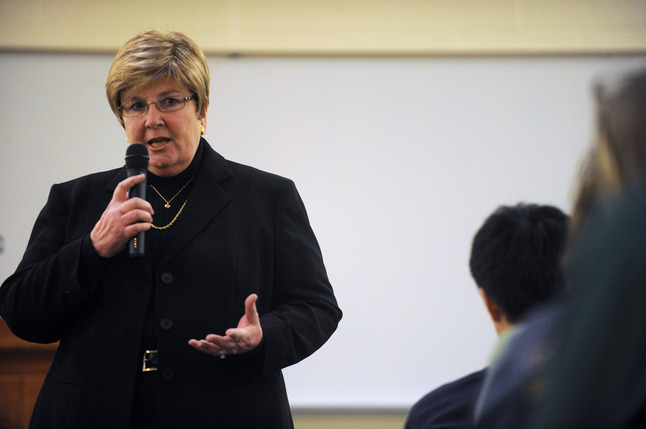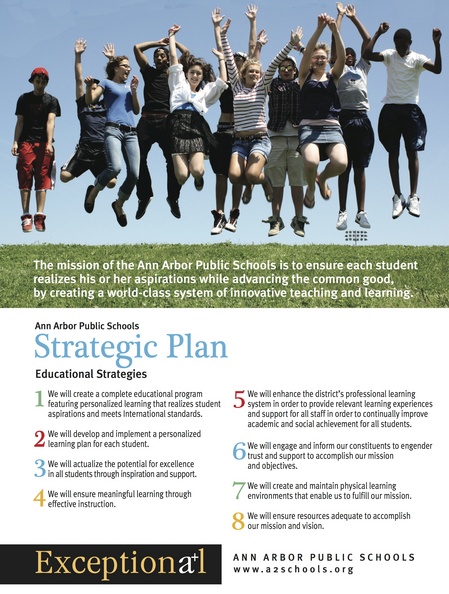
Ann Arbor Public Schools Superintendent Patricia Green speaks to a crowd in this AnnArbor.com file photo. At Wednesday's Board of Education meeting, Green honed in on how to move the district's strategic plan forward.
In 2006, the Ann Arbor school board approved the district's first strategic plan. The plan was meant to serve as a roadmap for guiding the work of the district.
It includes eight goals or areas of focus to ensure students are receiving a world-class education. Each of the eight goals includes specific action steps, such as:
- Develop a rigorous career and technical education program that leads to college credit or a formal certification for students.
- Develop curriculum that prepares students to compete in a global society.
- Provide extended learning opportunities outside of typical school hours at all buildings.
- Provide teachers with constructive feedback and classroom support throughout the school year.
The district's strategic plan was one of the reasons Superintendent Patricia Green first wanted to come to Ann Arbor in 2011, she recalled to the Board of Education at Wednesday's Committee of the Whole Meeting.
"But when I got here, I actually had great difficulty getting my arms around the plan."
Green said a strategic plan should provide purposeful direction and be a document used by all on a daily basis.
But what she found was not everyone was aware of what was in the plan and no work was being done on a few of the eight strategies. So Green set out to deliver on the promise she made in her interview with AAPS: to "focus like a laser beam" on the strategic plan.
Green and her instructional team spent months reviewing the progress that has been made and identifying what's next for the strategic plan. On Wednesday, central and building administrators — led by Deputy Superintendent of Instruction Alesia Flye — presented the 135-page report to the board.
The executive summary of the report says recently, the district's instructional work has been focused on aligning its curriculum with the common core state standards for math and language arts, which Michigan adopted in 2010.
The district's instructional staff also is working to improve curriculum consistency throughout the district and to help teachers develop personalized learning plans for every student.
One item school officials are trying to spread the word about is personal curriculums. The personal curriculum concept was introduced by the state and actually is included in state statute.
According to the district's report on the strategic plan, a personal curriculum is a documented process to modify or accelerate certain aspects of the Michigan Merit Curriculum based on a student's individual needs. The MMC is the state's rigorous set of high school graduation requirements that was signed into law in 2006.
Per state statute, a student could request a personal curriculum from their school for one of four reasons: to modify math requirements; to go beyond the academic requirements by adding more math, science, English or world language credits; to modify credit requirements for a special education student; or because the student transferred from out of state or a nonpublic school. The idea behind the personal curriculum is to help at-risk students remain on-track for graduation and to receive their diplomas.
Elaine Brown, assistant superintendent of student intervention and support services, said the district has developed personal curriculums for nine high school students to date. She said AAPS staff must undergo training and professional development soon so more of the district's teachers, counselors and department chairpersons understand the personal curriculum process and how to write one.

This poster was distributed to every classroom in the Ann Arbor Public Schools year to help raise awareness of the district's strategic plan.
"A virtual learning academy would embrace the district's rigorous curriculum and deliver it in an online format," the report says. "Students could learn in their own way at any time, in any place and at their own pace. This may be an appealing option for families who are not currently enrolled in Ann Arbor."
Gov. Rick Snyder and Republican legislators support statewide education reforms that would allow for any-time, any-place, any-pace learning by broadening the definition of an educational institution and permitting per-pupil funding to follow the student from district to district, school to school, Vice President Christine Stead reminded her colleagues Wednesday night.
She was pleased to hear AAPS is exploring the possibility of an online learning academy and using technology to offer more options for students. She said parents are going to be bombarded with words like "choice" in the coming months.
"Technology is a key enabler," Stead said. "We need to make sure we are aligning what kinds of choice we offer in the future with, in particular, quality and what kinds of outcomes we offer."
Another option officials are researching, which ties in with Ann Arbor's goal for its students to compete at an international level, is housing an International Baccalaureate (IB) degree program in-district.
Right now AAPS is a partner with the Washtenaw Intermediate School District and has students attending Washtenaw International High School, an IB program that opened in fall 2011.
WiHi is a consortium between all of the districts in the county except Chelsea, Dexter and Manchester. Dexter Community Schools launched its own IB program in September 2012.
Green said school officials are not proposing anything: "It's just a study. We're studying it because it's part of our (strategic) plan. The whole concept of international standards is huge. We're pleased with the work we're doing with the WISD program."
Flye added some of the feedback the WISD has received from Ann Arbor families about why they don't participate in the IB program is because it is not housed within AAPS. She said this could be due both to transportation and familiarity issues.
Danielle Arndt covers K-12 education for AnnArbor.com. Follow her on Twitter @DanielleArndt or email her at daniellearndt@annarbor.com.